Hassan II of Morocco
King Hassan II (Arabic: الْحسْنُ الثاني بْن مُحَمَّدُ بْن يوسف بْن الْحسْنِ بْن الشَّرِيفِ بْن عَلِيُّ الْعَلَوِيِّ,[1] MSA: (a)l-ḥasan aṯ-ṯānī, Maghrebi Arabic: el-ḥasan ett(s)âni; 9 July 1929 – 23 July 1999) was King of Morocco from 1961 until his death in 1999. He was a member of the Alaouite dynasty. He was the eldest son of Mohammed V, Sultan, then King of Morocco (1909–1961), and his second wife, Lalla Abla bint Tahar (1909–1992). Hassan was known to be one of the most severe rulers of Morocco, widely accused of authoritarian practices and of being an autocrat and a dictator, particularly during the Years of Lead.
| Hassan II ⵍⵃⴰⵙⴰⵏ ⵡⵉⵙ ⵙⵉⵏ الْحسْنُ الثاني الْعَلَوِيَّ | |
|---|---|
| Amir al-Mu'minin | |
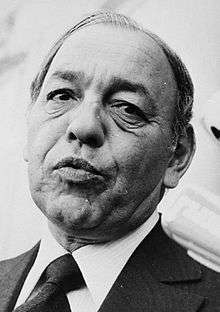 Hassan II in 1981 | |
| King of Morocco | |
| Reign | 26 February 1961 – 23 July 1999 |
| Predecessor | Mohammed V |
| Successor | Mohammed VI |
| Prime Ministers | |
| Born | 9 July 1929 Rabat, Morocco |
| Died | 23 July 1999 (aged 70) Rabat, Morocco |
| Burial | Royal Mausoleum, Rabat, Morocco |
| Spouse | Princess Lalla Fatima Princess Lalla Latifa |
| Issue | |
| Dynasty | Alaouite |
| Father | Mohammed V |
| Mother | Lalla Abla bint Tahar |
| Religion | Sunni Islam |
Biography
Youth and education
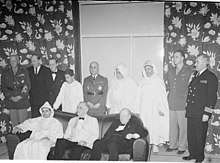
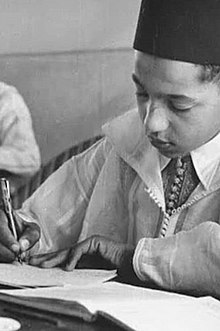
Hassan was educated at the Royal Academy in Rabat, where a class created for him was instructed by a faculty including Mehdi Ben Barka.[2] Hassan then earned a law degree from the University of Bordeaux.
He was exiled to Corsica by French authorities on 20 August 1953, together with his father Sultan Mohammed V. They were transferred to Madagascar in January 1954. Prince Moulay Hassan acted as his father's political advisor during the exile. Mohammed V and his family returned from exile on 16 November 1955.
Prince Moulay Hassan participated in the February 1956 negotiations for Morocco's independence with his father, who later appointed him Chief of Staff of the newly founded Royal Armed Forces in April 1956. In the unrest of the same year, he led army contingents battling rebels in the mountains of the Rif. Mohammed V changed the title of the Moroccan sovereign from Sultan to King in 1957. Hassan was proclaimed Crown Prince on 19 July 1957, and became King on 26 February 1961, after his father's death.
Rule
Hassan's rule, one characterized by a poor human rights record that was labelled as "appalling" and perhaps one of the worst in Africa.[3] strengthened the Alaouite dynasty. In Morocco's first constitution of 1963, Hassan II reaffirmed Morocco's choice of a multi-party political system, the only one in the Maghreb at that time. The constitution gave the King large powers he eventually used to strengthen his rule, which provoked strong political protest from the UNFP and the Istiqlal parties that formed the backbone of the opposition.[4]
In June 1965, Hassan suspended the constitution of 1962, dissolved the Parliament, declared a state of emergency, and ruled directly, although he did not completely abolish the mechanisms of parliamentary democracy.[5] When elections were eventually held, they were mostly rigged in favour of loyal parties. This caused severe discontent among the opposition, and protest demonstrations and riots challenged the King's rule. A US report observed that "Hassan appears obsessed with the preservation of his power rather than with its application toward the resolution of Morocco's multiplying domestic problems."[4]
Many militants of the National Union of Popular Forces were imprisoned and some party leaders sentenced to death. Student protests that took place 21 March 1965 in Casablanca, and devolved into general riots the following day; their violent repression caused many casualties. In the aftermath, on 26 March, Hassan II gave a speech that he concluded with: "There is no greater danger to a country than a so-called intellectual; it would have been better if you had all been illiterate."[6][7]
In October 1965, Mehdi Ben Barka was kidnapped in Paris and secretly murdered by Mohamed Oufkir.[2]
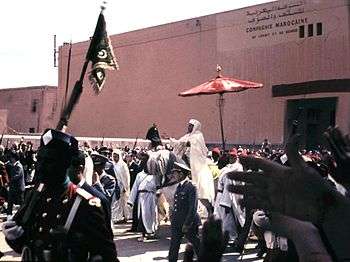
In the early 1970s, King Hassan survived two assassination attempts. The first, on 10 July 1971, was a coup d'état attempt allegedly supported by Libya, organized by General Mohamed Medbouh and Colonel M'hamed Ababou and carried out by cadets during a diplomatic function at the King's summer palace in Rabat during his forty-second birthday party.[8] Important guests, including the Belgian Ambassador Marcel Dupert, were placed under house arrest, and the King himself was taken to a small pavilion.
Rabat's main radio station was taken over by the rebels and broadcast propaganda stating that the King had been murdered and a republic founded. The coup ended the same day when royalist troops took over the palace in combat against the rebels. It was subsequently claimed by the Moroccan authorities that the young cadets had been misled by senior officers into thinking that they were acting to protect the king.
On 16 August 1972, during a second attempt, four F-5 military jets from the Royal Moroccan Air Force fired upon the King's Boeing 727 while he was travelling back to Rabat from France, many bullets hit the fuselage but they failed to bring the plane down.[9] Allegedly, the King himself hurried to the cockpit, took control of the radio and shouted: "Stop firing you fools, the Tyrant is dead!" Eight people were killed when the jets strafed the awaiting reception dignitaries.[10] General Mohamed Oufkir, Morocco's defense minister, was the man behind the coup and was officially declared to have committed suicide after the attack. His body, however, was found with several bullet wounds.[11]
In the Cold War era, Hassan II allied Morocco with the West generally, and with the United States in particular. There were close and continuing ties between Hassan II's government and the CIA, who helped to reorganize Morocco's security forces in 1960.[12] Hassan served as a back channel between the Arab world and Israel, facilitating early negotiations between them such as Operation Yachin to secretly migrate Moroccan Jews to Israel.[13][14]
According to Shlomo Gazit of Israeli intelligence, Hassan II invited Mossad and Shin Bet agents to bug the Casablanca hotel where the Arab League Summit of September 1965 would be held to record the conversations of the Arab leaders.[15] This information was instrumental in Israel's victory in the Six-Day War. According to Ronen Bergman, Mossad then supplied information leading to Mehdi Ben Barka's capture and assassination in October.[16]
Part of a series on the |
|---|
| History of Morocco |
 |
|
|
Related topics
|
|
|
During Hassan II's reign, Morocco recovered the Spanish-controlled area of Ifni in 1969, and militarily seized two-thirds of Spanish Sahara through the "Green March" in 1975. The latter issue continues to dominate Moroccan foreign policy to this day. Relations with Algeria have deteriorated sharply due to the Western Sahara affair, as well as due to Moroccan claims on Algerian territory (Tindouf and Bechar), which unleashed the brief 1963 Sand War. Relations with Mauritania were tense too, as Morocco only recognized it as a sovereign country in 1969, nearly a decade after Mauritania's independence, because of Moroccan claims on the country (see Great Morocco). In 1985, Hassan II suspended Morocco's membership of the Organization of African Unity and enters into conflict with Burkinabe President Thomas Sankara because of his decision to recognize the Sahrawi Arab Democratic Republic.
Economically, Hassan II adopted a market-based economy, where agriculture, tourism, and phosphates mining industries played a major role. On 3 March 1973, Hassan II announced the policy of Moroccanization, in which state-held assets, agricultural lands, and businesses that were more than 50 percent foreign-owned—and especially French-owned—were transferred to political loyalists and high-ranking military officers.[17][18] The Moroccanization of the economy affected thousands of businesses and the proportion of industrial businesses in Morocco that were Moroccan-owned immediately increased from 18% to 55%.[17] 2/3 of the wealth of the Moroccanized economy was concentrated in 36 Moroccan families.[17]
Morocco's human rights record was extremely poor during the period from the 1960s to the late 1980s, which was labelled as the "years of lead"[19][20] and saw thousands of dissidents jailed, killed, exiled or forcibly disappeared. During this time, Morocco was one of the most repressive and undemocratic nations in the world. However, Morocco has been labelled as "partly free" by Freedom House, except in 1992 and 2014 when the country was labelled "Not free" in those years respectively. The country would only become more democratic by the early 1990s amid strong international pressure and condemnation over the nation's human rights record. Due to the strong rebuke from other nations and human rights groups, and also because of the realistic threat of international isolation, Hassan II would then gradually democratize the nation over time. Since then, Morocco's human rights record has improved modestly, and improved significantly following the death of Hassan II.
King Hassan II had extended many parliamentary functions by the early 1990s and released hundreds of political prisoners in 1991, and allowed the Alternance, where the opposition assumed power, for the first time in the Arab World. He set up a Royal Council for Human Rights to look into allegations of abuse by the State.
Death
Hassan died of pneumonia and other health consequences in his birth town at the age of 70 on 23 July 1999. A national funeral service was held for him in Rabat, with over 40 heads of state in attendance, notably UN Secretary General Kofi Annan, American President Bill Clinton and French President Jacques Chirac. He was buried in the Mausoleum of Mohammed V. The coffin of Hassan II, carried by King Mohammed VI, his brother Prince Moulay Rachid and his cousin Moulay Hicham, was covered with a green fabric, in which the first prayer of Islam, "There is no god but God", is inscribed in golden writing.[21]
Honours and decorations
| Royal styles of King Hassan II of Morocco | |
|---|---|
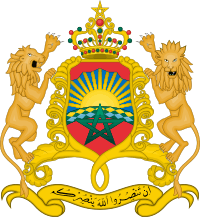 | |
| Reference style | His Majesty |
| Spoken style | Your Majesty |
National orders:


.gif)
.svg.png)
.gif)

.gif)
.gif)
Foreign orders:









.gif)



_-_ribbon_bar.gif)

_-_ribbon_bar.gif)

_-_ribbon_bar.gif)





_-_ribbon_bar.gif)




_-_ribbon_bar.gif)
_-_ribbon_bar.gif)





Family
King Hassan II had five children with his wife Lalla Latifa Hammou, a member of the Zayane tribe, whom he married in 1961:
- Princess Lalla Meryem (born on 26 August 1962 in Rome).
- King Mohammed VI (born 21 August 1963 in Rabat).
- Princess Lalla Asma (born on 29 September 1965 in Rabat).
- Princess Lalla Hasna (born on 19 November 1967 in Rabat).
- Prince Moulay Rachid (born on 20 June 1970 in Rabat).
The king had one other wife, Lalla Fatima bint Qaid Ould Hassan Amhourak (cousin of Latifa Hammou), whom he also married in 1961. They had no children.
The father of Hassan II was Mohammed V of Morocco and his mother was Lalla Abla bint Tahar. He had five sisters and one brother:
- Lalla Fatima Zohra, born on 29 June 1929 in Rabat, died on 10 August 2014 in Cabo Negro (from the first marriage of Mohammed V of Morocco).
- Lalla Aicha, born on 17 June 1930 in Rabat, died on 4 September 2011 in Rabat (from the second marriage of Mohammed V, with Lalla Abla).
- Lalla Malika, born on 14 March 1933 in Rabat (from the second marriage of Mohammed V).
- Moulay Abdallah, born on 30 July 1935 in Rabat, died on 20 December 1983 in Rabat (from the second marriage of Mohammed V).
- Lalla Nuzha, born on 29 October 1940 in Rabat, died on 2 September 1977 in a car crash near Tétouan (from the second marriage of Mohammed V).
- Lalla Amina, born on 8 April 1954 in Antsirabe, died on 16 August 2012 in Rabat (from the third marriage of Mohammed V of Morocco, with Lalla Bahia, died in August 2012 in Rabat).[22]
Publications
- La mémoire d'un roi, Paris, Plon, 1993
- Le Génie de la modération, Paris, Plon, 2000
See also
- List of Kings of Morocco
- History of Morocco
References and links
- الدرر الفاخرة بمآثر الملوك العلويين بفاس الزاهرة
- "قضية المهدي بن بركة تعود للواجهة بقوة في المغرب بعد مرور نصف قرن على اختطافه". CNN Arabic (in Arabic). 30 October 2015. Retrieved 11 July 2019.
- "Morocco 'Facebook prince' pardon". BBC. 19 March 2008. Retrieved 4 May 2010.
- Gleijeses, Piero (1996). "Cuba's First Venture in Africa: Algeria, 1961–1965". Journal of Latin American Studies. 28 (1): 159–195. doi:10.1017/s0022216x00012670. JSTOR 157991.
- Miller, Susan Gilson. (2013). A history of modern Morocco. New York: Cambridge University Press. pp. xvii. ISBN 9781139624695. OCLC 855022840.
- Miller, Susan Gilson. (2013). A history of modern Morocco. New York: Cambridge University Press. p. 169. ISBN 9781139624695. OCLC 855022840.
- Yabiladi.com. "23 مارس 1965..عندما تحولت شوارع الدار البيضاء إلى أنهار من الدماء". www.yabiladi.ma (in Arabic). Retrieved 11 July 2019.
- Gibson Miller, Susan (2013). A History of Modern Morocco. New York: Cambridge University Press. p. 175. ISBN 978-0521008990.
- Gibson Miller, Susan (2013). A History of Modern Morocco. New York: Cambridge University Press. p. 177. ISBN 978-0521008990.
- "Jets attack Moroccan King's plane", The Guardian, 17 August 1972
- Byrne, Jennifer (11 July 2001). "Interview with Malika Oufkir". Foreign Correspondent. ABC News (Australia). Archived from the original on 25 July 2008. Retrieved 5 August 2014.
- Victoria Brittain (2 July 2001). "Ben Barka killed with French help". The Guardian. London. Retrieved 19 October 2010.
- "هكذا وافقت السلطات المغربية على تهجير اليهود بين 1956 و1964". الأول (in Arabic). 6 June 2017. Retrieved 11 July 2019.
- Szulc, Tad (1991). The Secret Alliance: The Extraordinary Story of the Rescue of the Jews Since World War II. Farrar, Straus & Giroux. ISBN 978-0-374-24946-5.CS1 maint: ref=harv (link)
- Surkes, Sue. "Morocco tipped off Israeli intelligence, 'helped Israel win Six Day War'". www.timesofisrael.com. Retrieved 7 July 2019.
- Bergman, Ronen (2018). Rise And Kill First: The Secret History of Israel's Targeted Assassinations. Random House. pp. 86–94. ISBN 978-1-4000-6971-2.
- Miller, Susan Gilson. (2013). A history of modern Morocco. New York: Cambridge University Press. p. 184. ISBN 9781139624695. OCLC 855022840.
- "Marocanisation : Un système et des échecs". Aujourd'hui le Maroc (in French). Retrieved 17 July 2019.
- Hamilton, Richard (13 January 2007). "Laughter, freedom and religion in Morocco". BBC. Retrieved 4 May 2010.
- George Joffé. "Morocco". Britannica. Retrieved 19 October 2010.
- Highbeam
- "Accueil: activites_princieres". archive.is. 22 July 2011. Archived from the original on 22 July 2011. Retrieved 24 February 2018.
External links

- History of Morocco
Hassan II of Morocco Born: 9 July 1929 Died: 23 July 1999 | ||
| Regnal titles | ||
|---|---|---|
| Preceded by Mohammed V |
King of Morocco 1961–1999 |
Succeeded by Mohammed VI |